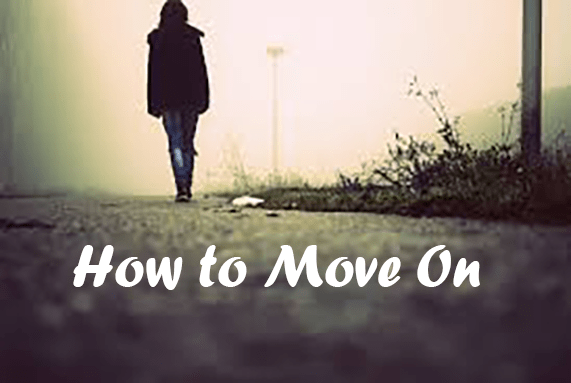Moving on from something or someone can be hard and it seems to make no difference whether the circumstances or person we need to move on from was a good or a bad thing.
Letting go and stopping the thoughts and memories from going around in your mind can be tricky. However, two things are clear
- You need to move on, the past needs to stay in the past where it belongs and holding onto it only hurts more.
- The way you move on from good or bad things in your past is the same.
Ruminating negatively about the past causes depression as does holding onto guilt and regret, there is no positive outcome from negative introspecting about the past. You can learn from it of course, but take the lesson into the future with you, don’t drag the past with you.
Every time you focus on events in the past you play a 5D video in your mind, you recall the sights, smells, sounds, sensations and emotions; your brain doesn’t know the difference between imagination and reality, so when you remember events that have a negative emotion attached to it, you relive those emotions again and again and again and you keep them alive. Every time you remember something, you reinforce the neural pathways that memory occupies.
Think about it for a moment; have you ever practiced remembering a script or something important that you need to remember – how do you make it stick? Do you remember learning your times tables at primary school? You go over it many times until you can recall it without thinking too hard. Sadly this also happens with bad memories, the more you go over it, the more embedded it becomes. Sometimes we get trapped in a vicious cycle of trying to figure out ‘why’.
It’s a very human trait to be uncomfortable with no knowing, but sometimes there is no ‘why’, sometimes shit just happens. Equally pointless is trying to understand someone else’s motivations for the things they have done; we are all different, we have all had a different upbringing, we have different personality types, the things that have influenced and shaped us in life are not the same and you can’t read someone else’s mind. What we do is put ourselves in that situation and run through different scenarios of ‘if that was me, why would I do that’ or we try out motivations from experiences of other people, however, it is our imagination that does this and mostly has no bearing on reality at all, especially when it involves someone else.
Moving on from the loss of something or someone who was positive and significant in our lives hurts just as much, but you need to give yourself time to go through the grieving process. You will go through sadness, regret and anger before arriving at acceptance, it’s normal, however, you can help the process by focusing on the positive times, remembering with fondness rather than focusing on your loss and give yourself a break.
But if you’re trying to move on from something right now, I know you will tell me that you can’t stop the intrusive thoughts – how do you stop them?
Rule number 1
Stop trying to stop them Where your thoughts and mind are concerned, as soon as you tell yourself to not do something, you’re doing it. For example, if I tell you to not think about a pink elephant – what are you thinking of? And if I say ‘don’t think of that pink elephant that’s not chasing a blue elephant’s tail’, what is in your mind now? It’s equally as useless to tell yourself to not think about whatever it is you need to move on from, all it does is embed it deeper.
Rule number 2
Focus on the positive things in your life To allow the negative neural connections to fade away, you need to practice strengthening the positive ones and this falls into three main categories
Positive Activity – get active, keep yourself busy doing things you enjoy. Particularly helpful is any sort of exercise. You may or may not know that exercise is not really about your body, the effect it has physically is a bonus side effect, the main benefits to exercise are on your mental health. Physical exercise creates serotonin which makes you feel good and makes the connections in your intellect (the positive part of your mind) so you are able to think clearly and positively, it also produces other feel good neurotransmitters and hormones and grows brain cells. But it also burns off the adrenalin which is keeping you locked in the negative part of your brain where you obsess about the loss.
Positive Interaction – you need to be with people. Humans are tribal, we are designed to live in groups and communities, however, these days it is too easy to become isolated with too much time to think. If your life is lacking people in it, get involved with new social activities and groups – even better join a group exercise activity or a team sport and you get a double wammy of feel good hormones and neurotransmitters. I’m sure you’ve experienced this before; you accept an invitation to an evening out, party or social event of some kind, but as the time gets closer you don’t feel up to going for some reason or another, but you can’t think of a good enough excuse to get out of it so you go anyway thinking you’ll just stay for an hour and then make excuses to leave, at least you’ve shown your face. But within that first hour, you’ve forgotten all about wanting to go early and you have one of the best evenings out. There’s a reason for this; when you get amongst other people you create good neurotransmitters dopamine and serotonin that make you feel good because you are doing what humans should do.
Positive thinking – practice thinking about the positive things in your life, switch your focus on to things or thoughts that are good for you. As they say ‘every cloud has a sliver lining’ look for those silver linings, don’t focus on the cloud. Those are the three ‘positive’ things that you can start focusing on, building new positive things into your life where the loss may have left a hole. If something is taken out of your life, it does leave a hole, if you don’t make an effort to fill that hole with something else then you will just keep staring at the hole, thinking about what was there before.
Rule Number 3
Distract Yourself When you’re mind turns to thinking about the things that are stopping you from moving on, you need to focus your mind on something else to distract it. You will know this if you have had children or have small children around – how do you stop them doing something you don’t want them to do? You distract them onto something else, you grab their attention and focus it elsewhere. Do this with yourself – don’t sit in the moment allowing your mind to go over and over things that make you unhappy, if necessary get up and physically move somewhere else, even if that’s just to another room or chair.
If it’s happening when you can’t do something else or move, for example, when you’re driving or doing manual work, cooking or housework, my best tip is to listen to audio books. This is different from listening to the radio or music because you need to focus with your conscious mind in order to follow the narrative, having the radio or music on in the background only engages your subconscious so your mind wanders off to the past again.
Moving on takes time, you need to allow the negative thoughts to fade away, this will only happen if you stop nurturing them and focus on positive things instead.
People around you may try their best to help, but at the end of the day, it is only you who can take the steps you need to and fill the hole. In order to move on, you need to focus on yourself and get yourself to the best possible physical and mental condition you can, you need to take care of yourself.
Taking care of yourself is not selfish, it is selfless because when you take care of yourself as a priority, then you feel good and you have the internal strength and resources to give to others.

Disclaimer | Privacy Policy | Terms and Conditions
Copyright © OLD TOWN HYPNOTHERAPY 2016 All Rights Reserved


I just read what Emma has wrote it’s so true and really helpful .
Thank you for taking the time to say that Lisa 🙂